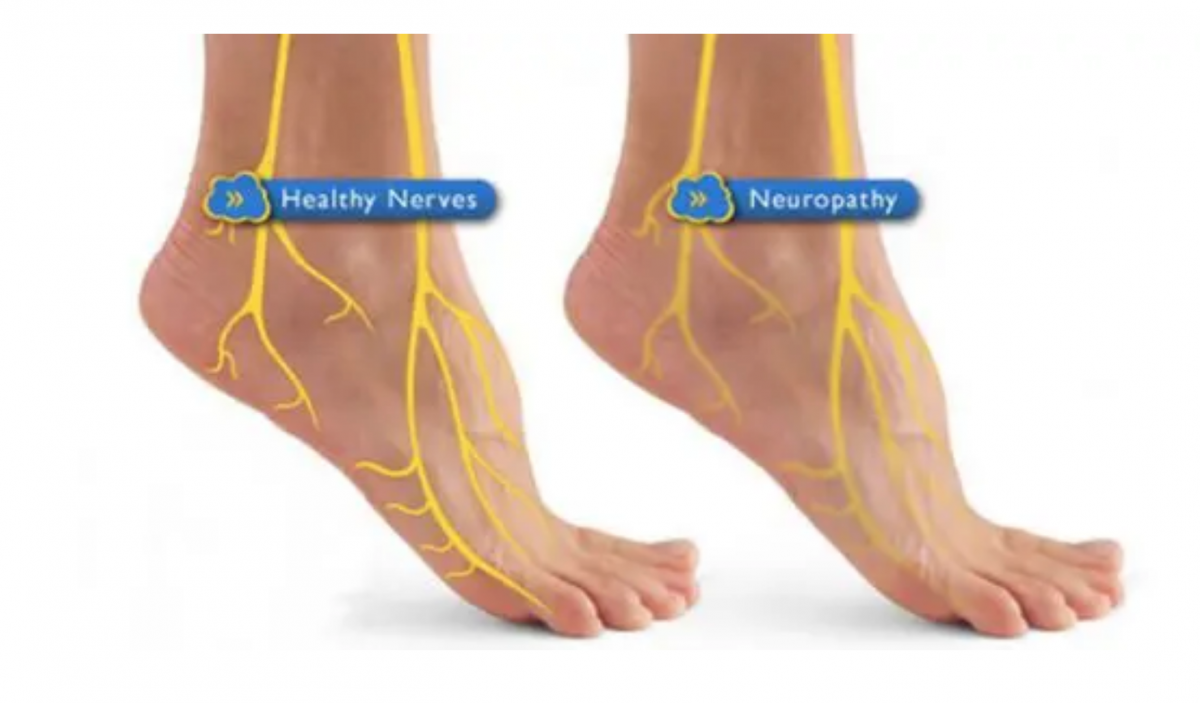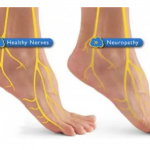Six signs of neuropathy with Dr. Suhyun An, DC
Introduction
Neuropathy is a general term for any disease that causes damage to nerves. Neuropathy causes pain, tingling, numbness, and other symptoms in the body.
Many people with neuropathy are often misdiagnosed and do not receive treatment until it's too late. Some types of neuropathy can be managed by making lifestyle changes while others require surgery or medication.
What is neuropathy?
Dr. Suhyun An says neuropathy is a broad term that describes any type of nerve damage. It can be caused by a variety of conditions, including diabetes, alcoholism, vitamin deficiencies, and injuries. Neuropathies can affect any part of the body and cause symptoms like pain and weakness in your hands or feet. There are many different types of neuropathies:
-
Peripheral Neuropathy (commonly called diabetic neuropathy) is caused by high blood sugar levels in diabetics
-
Trigeminal Neuralgia affects the trigeminal nerve (a cranial nerve responsible for feeling sensations on your face)
-
Anterior Medullary Syndrome results from compression on the spinal cord at any point from T1-L4
What causes neuropathy?
Dr. Suhyun An says research shows that there are several factors that can contribute to neuropathy, including diet and nutrition. Smoking, alcohol use, drug use, and genetics have also been linked with the development of neuropathy. Exposure to toxins such as pesticides, solvents, and heavy metals may also increase your risk of developing this condition. Poor circulation has been shown to be a risk factor for peripheral neuropathy as well.
All these factors can damage the nervous system in different ways that lead to nerve cell death or dysfunction (http://www.ninds.nih.gov/disorders/peripheralneuropathies/detail_peripheralneuropathy_1). In addition to these physical causes for neuropathy symptoms, there is also a strong link between diabetes and vitamin deficiency (http://www.mayoclinicproceedingsannualmeetinginternationalnewsreleasearticlefulltext).
How does neuropathy impact your body?
-
Numbness, pain, and tingling in the hands and feet
-
Weakness, loss of balance, and even paralysis
Neuropathy is a condition that affects the nerves. It can cause numbness, pain, and tingling in the hands and feet. The symptoms vary from person to person depending on what type of neuropathy you are dealing with. Some people experience only mild symptoms such as slight tingling or cramping sensations in their legs or arms while others may have more severe symptoms like numbness or burning sensations. As a result, neuropathy can make everyday tasks difficult to perform without assistance from another person. There are many different causes of neuropathy including diabetes mellitus (diabetes), alcohol abuse, vitamin deficiency/malnutrition, repeated trauma (stressful activity), infections such as HIV/AIDS or hepatitis C virus (HCV) infection*, toxins like lead poisoning, etc.
What are some common symptoms of neuropathy?
The most common symptoms of neuropathy are numbness, tingling, pain, weakness, and burning sensation.
Numbness often occurs in the feet and hands but may also affect other parts of your body such as your arms or legs. You may notice that you're having a hard time feeling when something touches you or picking up small objects like pens or coins. A loss of sensitivity to touch may also lead to feelings of coldness in the affected area.
Tingling sensations could be felt as a slight tickle or vibration in your feet or hands and they can worsen at night when you lie down on your bed. These symptoms usually come on gradually and last for hours before they go away completely by themselves so make sure not to panic if this happens because it’s just normal!

What are some of the warning signs of neuropathy?
There are many warning signs of neuropathy, including:
-
Tingling and numbness in your hands and feet.
-
Loss of balance, coordination, and weakness.
-
Problems with memory, concentration, reasoning, and other thinking skills.
-
Problems with vision, hearing, taste, and smell.
-
Problems with urination or bowel movements (you may feel like you don’t empty properly).
What options do you have for treating nerve pain from neuropathy?
Your doctor may recommend medications to help manage your neuropathy. Medications can include pain relievers, antidepressants, and antiepileptic drugs.
Physical therapy is another option to consider. It can help increase blood flow in the affected area, which helps minimize nerve damage.
Surgery is sometimes necessary to remove damaged nerves or reconnect severed ones. The Mayo Clinic says that surgery helps patients who have severe nerve compression or have not responded adequately to other treatments such as physical therapy or medication.
If you're looking for a non-invasive treatment method for your nerve pains, reflexology could be an excellent choice for you—the practice of applying pressure to specific points on the feet has been used for centuries with great success by those seeking relief from various ailments including neuropathy pain management (and many other conditions). Reflexologists claim that by massaging certain areas on their clients' feet, they can relieve all kinds of problems including headaches and backaches as well as general muscle tension throughout their bodies; some even believe that reflexology has anti-aging effects because it helps regulate blood flow throughout one's whole body so they feel more energized overall!
If you have any of these symptoms, go see a doctor to find out for sure.
If you have any of the symptoms above, it’s important to see a doctor. You may have neuropathy and not even know it. Your doctor can help diagnose and treat your condition. Your doctor will probably ask you questions about your body and lifestyle habits. This is called an interview or history. The interview might be long, with many questions about what foods you eat and whether or not you exercise regularly. The doctor also might ask other questions based on what they think could be causing the problem with your nerves in their area of expertise (for example, if they think that diabetes might be causing some nerve problems).
If the diagnosis turns out to be diabetes or vitamin deficiency-related, then your doctor will discuss options for treatment with you at length before making any recommendations or referrals for further testing (such as blood glucose monitoring).
Conclusion
If you think you may have neuropathy, make an appointment with your doctor. It’s important to get the right treatment as soon as possible because persistent symptoms can lead to more serious complications.
with Dr. Suhyun An, DC
Introduction
Neuropathy is a general term for any disease that causes damage to nerves. Neuropathy causes pain, tingling, numbness, and other symptoms in the body.
Many people with neuropathy are often misdiagnosed and do not receive treatment until it's too late. Some types of neuropathy can be managed by making lifestyle changes while others require surgery or medication.
What is neuropathy?
Dr. Suhyun An says neuropathy is a broad term that describes any type of nerve damage. It can be caused by a variety of conditions, including diabetes, alcoholism, vitamin deficiencies, and injuries. Neuropathies can affect any part of the body and cause symptoms like pain and weakness in your hands or feet. There are many different types of neuropathies:
-
Peripheral Neuropathy (commonly called diabetic neuropathy) is caused by high blood sugar levels in diabetics
-
Trigeminal Neuralgia affects the trigeminal nerve (a cranial nerve responsible for feeling sensations on your face)
-
Anterior Medullary Syndrome results from compression on the spinal cord at any point from T1-L4
What causes neuropathy?
Dr. Suhyun An says research shows that there are several factors that can contribute to neuropathy, including diet and nutrition. Smoking, alcohol use, drug use, and genetics have also been linked with the development of neuropathy. Exposure to toxins such as pesticides, solvents, and heavy metals may also increase your risk of developing this condition. Poor circulation has been shown to be a risk factor for peripheral neuropathy as well.
All these factors can damage the nervous system in different ways that lead to nerve cell death or dysfunction (http://www.ninds.nih.gov/disorders/peripheralneuropathies/detail_peripheralneuropathy_1). In addition to these physical causes for neuropathy symptoms, there is also a strong link between diabetes or vitamin deficiency (http://www.mayoclinicproceedingsannualmeetinginternationalnewsreleasearticlefulltext).
How does neuropathy impact your body?
-
Numbness, pain, and tingling in the hands and feet
-
Weakness, loss of balance, and even paralysis
Neuropathy is a condition that affects the nerves. It can cause numbness, pain, and tingling in the hands and feet. The symptoms vary from person to person depending on what type of neuropathy you are dealing with. Some people experience only mild symptoms such as slight tingling or cramping sensations in their legs or arms while others may have more severe symptoms like numbness or burning sensations. As a result, neuropathy can make everyday tasks difficult to perform without assistance from another person. There are many different causes of neuropathy including diabetes mellitus (diabetes), alcohol abuse, vitamin deficiency/malnutrition, repeated trauma (stressful activity), infections such as HIV/AIDS or hepatitis C virus (HCV) infection*, toxins like lead poisoning, etc.
What are some common symptoms of neuropathy?
The most common symptoms of neuropathy are numbness, tingling, pain, weakness and burning sensation.
Numbness often occurs in the feet and hands but may also affect other parts of your body such as your arms or legs. You may notice that you're having a hard time feeling when something touches you or picking up small objects like pens or coins. A loss of sensitivity to touch may also lead to feelings of coldness in the affected area.
Tingling sensations could be felt as a slight tickle or vibration in your feet or hands and they can worsen at night when you lie down on your bed. These symptoms usually come on gradually and last for hours before they go away completely by themselves so make sure not to panic if this happens because it’s just normal!
What are some of the warning signs of neuropathy?
There are many warning signs of neuropathy, including:
-
Tingling and numbness in your hands and feet.
-
Loss of balance, coordination, and weakness.
-
Problems with memory, concentration, reasoning, and other thinking skills.
-
Problems with vision, hearing, taste, and smell.
-
Problems with urination or bowel movements (you may feel like you don’t empty properly).
What options do you have for treating nerve pain from neuropathy?
Your doctor may recommend medications to help manage your neuropathy. Medications can include pain relievers, antidepressants and antiepileptic drugs.
Physical therapy is another option to consider. It can help increase blood flow in the affected area, which helps minimize nerve damage.
Surgery is sometimes necessary to remove damaged nerves or reconnect severed ones. The Mayo Clinic says that surgery helps patients who have severe nerve compression or have not responded adequately to other treatments such as physical therapy or medication.
If you're looking for a non-invasive treatment method for your nerve pains, reflexology could be an excellent choice for you—the practice of applying pressure to specific points on the feet has been used for centuries with great success by those seeking relief from various ailments including neuropathy pain management (and many other conditions). Reflexologists claim that by massaging certain areas on their clients' feet, they can relieve all kinds of problems including headaches and backaches as well as general muscle tension throughout their bodies; some even believe that reflexology has anti-aging effects because it helps regulate blood flow throughout one's whole body so they feel more energized overall!
If you have any of these symptoms, go see a doctor to find out for sure.
If you have any of the symptoms above, it’s important to see a doctor. You may have neuropathy and not even know it. Your doctor can help diagnose and treat your condition. Your doctor will probably ask you questions about your body and lifestyle habits. This is called an interview or history. The interview might be long, with many questions about what foods you eat and whether or not you exercise regularly. The doctor also might ask other questions based on what they think could be causing the problem with your nerves in their area of expertise (for example, if they think that diabetes might be causing some nerve problems).
If the diagnosis turns out to be diabetes or vitamin deficiency-related, then your doctor will discuss options for treatment with you at length before making any recommendations or referrals for further testing (such as blood glucose monitoring).

Conclusion
If you think you may have neuropathy, make an appointment with your doctor. It’s important to get the right treatment as soon as possible because persistent symptoms can lead to more serious complications.
































